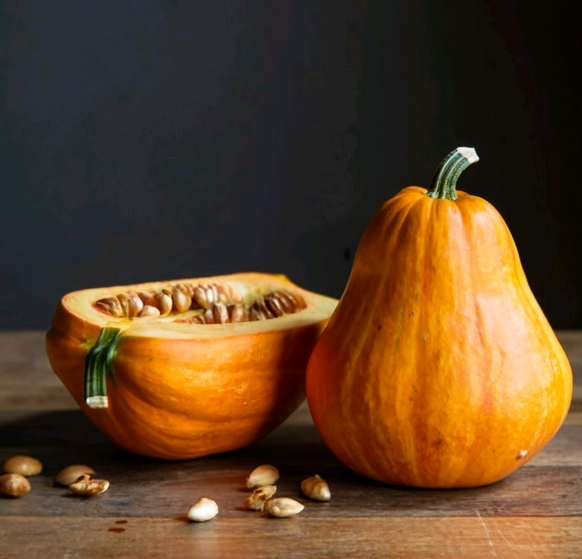Decoding Butternut Squash: Fruit Or Vegetable?

Butternut squash, scientifically known as Cucurbita moschata, is a versatile and nutritious ingredient commonly used in a variety of culinary preparations. However, there is often confusion regarding its classification as a fruit or a vegetable. In this article, we will explore the nature of butternut squash and determine whether it should be considered a fruit or a vegetable.
1. Botanical Classification
Botanically, butternut squash is classified as a fruit. It belongs to the Cucurbitaceae family, which includes other fruits such as melons, cucumbers, and pumpkins. Fruits are typically defined as the mature ovaries of flowering plants that contain seeds. In the case of butternut squash, it develops from the plant’s female flower and contains seeds in its fleshy pulp.
2. Culinary Uses
Although butternut squash is botanically a fruit, it is commonly used and referred to as a vegetable in culinary contexts. This is due to the way it is prepared and consumed in various dishes. Butternut squash is often roasted, sautéed, pureed, or mashed and used in soups, stews, casseroles, breads, muffins, and pies. Its sweet and nutty flavor lends itself well to savory preparations, making it a popular ingredient in vegetable-based dishes.
3. Nutritional Composition
Regardless of its classification, butternut squash offers numerous health benefits and is a valuable addition to a balanced diet. It is a rich source of essential nutrients, including fiber, vitamins, and minerals. Butternut squash is particularly high in vitamin A, vitamin C, magnesium, and potassium. It also contains significant amounts of vitamin B6, vitamin E, manganese, and folate. The nutritional composition of butternut squash makes it a nutritious choice for promoting overall health and wellness.
4. Health Benefits
Consuming butternut squash can contribute to several health benefits. Here are some of the potential benefits associated with including butternut squash in your diet:
- Vitamin Butternut squash is rich in beta-carotene, a precursor to vitamin A. Vitamin A is essential for maintaining healthy vision, supporting immune function, and promoting cell growth and differentiation.
- Antioxidants: Butternut squash is a good source of antioxidants, including beta-carotene and vitamin C. Antioxidants help neutralize harmful free radicals in the body, reducing the risk of chronic disease and promoting overall health.
- Digestive Health: The high fiber content of butternut squash can help support healthy digestion and prevent constipation. Fiber adds bulk to the stool and promotes regular bowel movements.
- Heart Health: Butternut squash is low in fat and cholesterol and high in potassium. Potassium is essential for maintaining healthy blood pressure levels and supporting cardiovascular health.
- Weight Management: Butternut squash is relatively low in calories and high in fiber, which can help promote satiety and reduce overall caloric intake. Including butternut squash in a balanced diet can support weight management efforts.
5. Culinary tips
Here are some culinary tips for incorporating butternut squash into your meals:
- Roast: Cut butternut squash into cubes or wedges, toss with olive oil, salt and pepper, and roast until tender and caramelized.
- Soups and Stews: Puree cooked butternut squash and use it as a base for creamy soups or add it to hearty stews for added flavor and texture.
- Side Dishes: Saute butternut squash with other vegetables or herbs for a flavorful and nutritious side dish.
- Baked Goods: Use cooked and pureed butternut squash as a substitute for pumpkin puree in recipes for bread, muffins, or pies.
BOTTOM LINE
While botanically classified as a fruit, butternut squash is generally considered a vegetable in culinary contexts. Its versatility, nutritional composition, and health benefits make it a valuable addition to a balanced diet. Whether you consider it a fruit or a vegetable, incorporating butternut squash into your meals can enhance both the flavor and nutritional value of your dishes.
FAQs
Is a butternut a fruit or a vegetable?
Butternut squash is botanically classified as a fruit due to its development from the female flower and the presence of seeds in its fleshy pulp. However, it is commonly referred to and used as a vegetable in culinary contexts.
Are butternuts a fruit?
Yes, butternuts are considered a fruit. They belong to the Cucurbitaceae family, which includes various fruits such as melons, cucumbers, and pumpkins. Butternuts develop from the ovaries of the plant’s female flowers and contain seeds.
Is pumpkin a vegetable or a fruit?
Squash, including butternut squash, is botanically classified as a fruit. However, culinarily, squash is often treated as a vegetable and used in savory preparations such as soups, stews, and side dishes.
Is acorn squash considered a fruit or a vegetable?
Similar to butternut squash, acorn squash is botanically classified as a fruit. It belongs to the Cucurbitaceae family and develops from the plant’s female flower. However, it is commonly used and referred to as a vegetable in cooking.
What are the different types of butternut squash?
Butternut squash comes in several varieties, each with its own unique characteristics. Some popular varieties include Waltham Butternut, Butterbush, Ponca, and Honeybaby. These varieties can vary in size, shape, and flavor, but they all share the characteristic sweet and nutty flavor of butternut squash.
How can I add butternut squash to my diet?
There are many ways to incorporate butternut squash into your meals. You can roast it, sauté it, or puree it for soups and sauces. It can be used as a stuffing for ravioli or added to salads for a touch of sweetness. Butternut squash can also be pureed and used in casseroles, breads, muffins, and pies, adding both flavor and nutritional value to your dishes.
Is butternut squash a healthy food?
Yes, butternut squash is a healthy choice. It is low in fat, cholesterol-free, and packed with essential nutrients. Butternut squash is a rich source of fiber, vitamins A and C, magnesium, and potassium. It also contains antioxidants, which contribute to overall health and well-being. Incorporating butternut squash into your diet can provide several health benefits, including supporting heart health, aiding digestion, and boosting the immune system.
